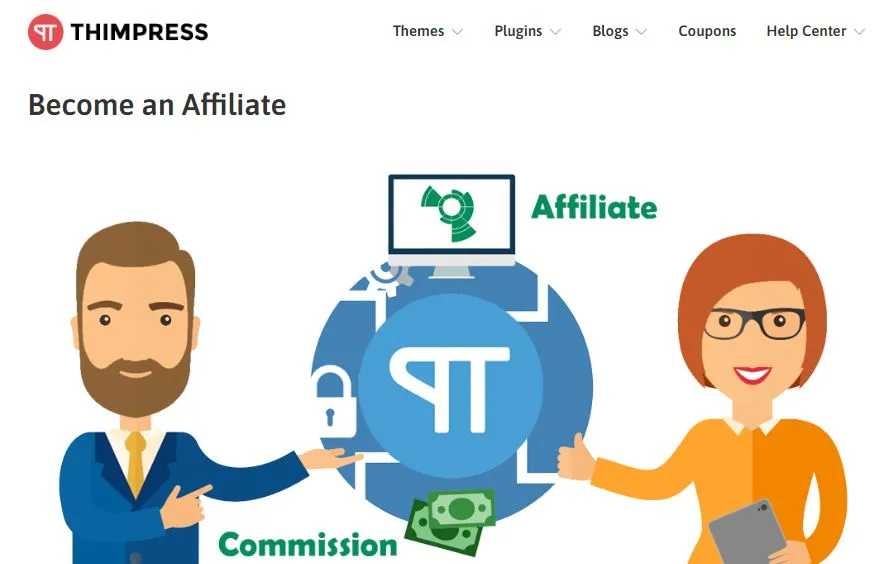Do you know that you can make money online by promoting products you love? Affiliate marketing can be a fantastic way to do just that.
But with any exciting opportunity, some try to take advantage.
That’s why it’s important to be aware of common affiliate marketing scams before you jump in.
Wait, let’s talk about how you can turn your passion into profit. If you’re interested in creating a website to promote affiliate products, consider using an affiliate marketing WordPress theme.
These themes are designed specifically to help you showcase products, create compelling content, and drive conversions.
Now is the time to start by understanding what affiliate marketing is all about.
Eduma – Landing Page For Online Course
We provide an amazing WordPress Landing Page with an AI Course Creator. Let’s find out!
Common Affiliate Marketing Scams Aimed At Affiliate Marketers
Affiliate marketers are frequently targeted by scammers who promote illegal or dubious products in exchange for little to no compensation.
Here are a few of the most common affiliate marketing scams targeting affiliate marketers.
1. Get-Rich-Quick Schemes: Promises Too Good to Be True
These scams lure you in with dreams of effortless wealth.
They’ll promise sky-high commissions for promoting dubious products, often with exaggerated claims about your earning potential.
How to spot this affiliate marketing scam:
- Unrealistic Earnings: If it sounds too good to be true, it probably is. Legitimate programs offer fair commissions, not overnight riches.
- Low-Quality Products: They often push products with little value, designed to make them money, not you.
- Vague Terms & Conditions: Be wary of programs with unclear rules or hidden clauses that prevent you from getting paid.
2. Fake Products: A Double-Edged Scam
This scam involves promoting either cheap knockoffs of real products or nonexistent digital products.
In the first case, customers get ripped off with a poor-quality imitation.
In the second, they pay for a product they never receive.
Either way, you don’t get paid.
How to spot this affiliate marketing scam:
- Suspicious Pricing: Products priced significantly lower than the real deal are a red flag.
- Unverified Brand: Research the brand and product. Look for real customer reviews, not just testimonials on the seller’s site.
- No Download or Support: For digital products, check if there’s actually a download link and working customer support.
3. Pyramid Schemes in Disguise: Multi-Level Marketing (MLM)
MLMs are a classic scam dressed up in a modern suit.
They focus on recruiting new members to buy into the “opportunity” rather than selling actual products.
Eventually, the well of recruits dries up, and the whole scheme collapses.
How to spot this affiliate marketing scam:
- Focus on Recruitment: They push recruitment heavily, promising big commissions for signing up new people.
- Shoddy Products: The products are often low-quality or overpriced, making genuine sales difficult.
- Upfront Fees: Beware of programs that require a “starter pack” or other upfront investment.
4. Pay-to-Play Affiliate Programs: A Myth
Legitimate affiliate programs are free to join.
Scammers might claim they have an “exclusive” program and require a fee to ensure “serious” marketers.
Don’t fall for it!
How to spot this affiliate marketing scam:
- Free to Join: Real programs won’t charge you to join. Some might require product knowledge or expertise, but never a fee.
- Beware of Bitcoin: If they ask for payment in Bitcoin, a non-refundable cryptocurrency, it’s a scam.
5. Fake Gurus and Influencers: All Hype, No Substance
These imposters pretend to be industry experts, selling useless courses and training programs.
They’ll promise high commissions for getting you to promote them but never deliver.
How to spot this affiliate marketing scam:
- No Track Record: They lack a history of proven success or verifiable expertise.
- Phony Testimonials: Testimonials might sound fake or be impossible to verify.
- Pushy Tactics: They use aggressive sales tactics to pressure you into promoting them.
- Fake Followers: Their social media following might be inflated with bot accounts.
6. Phishing Scams: Don’t Fall for the Bait
These scams aim to steal your login credentials and personal information.
They use fake websites or emails disguised as legitimate affiliate programs.
How to spot this affiliate marketing scam:
- Verify Websites: Double-check website addresses before logging in. If unsure, close the window and access the real site directly.
- Scrutinize Emails: Don’t click on links or provide information in suspicious emails. Legitimate programs won’t ask for login details via email. Additionally, be wary of emails that bypass DMARC authentication. Use a DMARC checker tool to verify the legitimacy of the sender.
- Beware of Social Media: Be cautious of unsolicited messages on social media or messaging apps, even if they use brand logos of affiliate platforms.
Common Affiliate Marketing Scams Aimed At Businesses
If you run an affiliate program to increase sales, you may be targeted by scammers in a variety of ways.
Here are some of the common affiliate marketing scams to watch out for:
1. Fraudulent Transactions: Fake Sales & Refunds
Imagine someone stealing money and getting rewarded for it.
That’s what happens with transaction fraud.
Scammers trick your system into thinking they made real sales using stolen credit cards or fake accounts.
You pay them a commission but then have to deal with refunds and chargebacks from angry (and possibly nonexistent) customers.
How to spot this affiliate marketing scam:
- Keep an eye on refunds and chargebacks: A sudden spike could be a sign of trouble.
- Compare refund rates of different affiliates: If one affiliate has a suspiciously high rate, investigate further.
2. Cookie Stuffing: Hidden Tracking Cookies
This scam involves planting invisible tracking codes (cookies) on unsuspecting users’ browsers.
These codes trick your system into thinking the scammer referred the customer, even if they never saw the affiliate’s website.
It’s like getting a commission for someone walking into your store after seeing a random billboard on the highway (that you didn’t pay for).
How to spot this affiliate marketing scam:
- Detecting suspicious activity: Some affiliate programs can detect suspicious activity.
- Monitor conversions in Google Analytics: Look for unusual URLs and traffic patterns.
- Allow traffic from pre-approved websites: Some programs only allow traffic from pre-approved websites. Anything outside those lists might be a scam.
3. Google Ad Keyword Hijacking: Stealing Your Ad Space
Imagine paying for prime advertising space, only to have someone else use it to promote themselves (and steal your customers)!
That’s Google Ad Keyword Hijacking.
Scammers buy ads using your brand keywords, making it harder and more expensive for you to reach potential customers.
They might even send those customers through their own website first, making it even sneakier.
How to spot this affiliate marketing scam:
- Use tools like Semrush to monitor your top PPC keywords on Google.
- Watch for sudden spikes in traffic from unknown sources.
- Be wary of affiliates with unusually high conversions or suspicious referral patterns.
4. Fake Leads: A Numbers Game Gone Wrong
Some affiliates might try to pad their pockets with fake leads, generated using stolen data, bots, or even just paying people to create fake accounts.
These leads are worthless, wasting your time and resources.
How to spot this affiliate marketing scam:
- Require double opt-in for leads, making them verify their email address.
- Reach out to leads to confirm their interest. If they seem nonexistent, investigate the affiliate sending them.
- Look for affiliates sending a suspiciously consistent number of leads every day. It could be a red flag.
5. Click Fraud: Clicking Your Way to Empty Pockets
This scam involves generating fake clicks on your affiliate links, driving up your costs without any real benefit.
Scammers might use automated bots or even click farms (where people get paid to click on ads) to inflate the numbers.
How to spot this affiliate marketing scam:
- Monitor Google Analytics for suspicious traffic patterns: random locations, low conversion rates, and unusual sources.
- Track IP addresses to identify potential click fraud.
- Some affiliate management software can help detect and prevent click fraud.
6. URL Hijacking: Website Copycats
Imagine someone setting up a website that looks almost exactly like yours but with a slightly misspelled domain name.
They trick people into clicking through to your site (but earning the commission themselves).
It’s like stealing customers from your doorstep!
How to spot this affiliate marketing scam:
- Regularly check referral domains in Google Analytics. Look for suspicious or misspelled URLs.
- Be wary of traffic sources with no content promoting your products or services.
How To Avoid Affiliate Marketing Scams
Here’s a breakdown of key strategies to protect yourself, whether you’re an affiliate marketer or a business owner:
1. Partner with Reputable Platforms:

Look for established affiliate networks with a strong track record. Are affiliate programs legit? Absolutely! Reputable platforms like ShareASale, Impact, ThimPress, and Amazon curate legitimate businesses and products, handle payouts securely and have robust fraud prevention measures.
For building your website, consider using a dedicated Amazon affiliate WordPress theme to streamline the process and provide features specifically designed for showcasing Amazon products.
2. Research Before You Promote:
Don’t blindly promote everything. Investigate the company and product thoroughly.
Is affiliate marketing real? Yes, but it’s important to choose reputable companies.
Check for red flags like unrealistic income claims, hidden fees, or negative customer reviews on independent websites.
Look for a company with a solid reputation and a quality product or service.
3. Scrutinize Terms & Conditions:
Read the affiliate program’s terms and conditions carefully.
Be wary of programs with unfair clauses or restrictions on how you can promote their products.
4. Beware of “Get Rich Quick” Schemes:
If something sounds too good to be true, it probably is. Avoid programs promising instant wealth or effortless income.
Sustainable affiliate marketing requires effort, strategy, and valuable content.
5. Monitor Your Traffic (Marketers & Businesses):

Regularly monitor your website traffic for suspicious activity.
Tools like Google Analytics (with a plugin like MonsterInsights for WordPress) can help identify unusual spikes in clicks or referrals.
6. Track Clicks and Conversions:

Use affiliate link management tools like ThirstyAffiliates or PrettyLinks to track clicks and conversions from your affiliate links.
This helps you identify which links are performing well and detect any potential fraud.
7. Communicate with Affiliate Managers:
If you’re a business owner, establish clear communication channels with your affiliate marketers.
Maintain an open dialogue to address any concerns and ensure everyone’s working towards a mutually beneficial partnership.
8. Use Fraud Detection Tools (Businesses):
Consider investing in fraud detection tools specifically designed for affiliate marketing.
These tools can help identify and prevent click-jacking, cookie stuffing, and other fraudulent activities.
Read More: Content Marketing Strategies for Boosting Your eLearning Courses: 7 Simple Tips
Contact US | ThimPress:
Website: https://thimpress.com/
Fanpage: https://www.facebook.com/ThimPress
YouTube: https://www.youtube.com/c/ThimPressDesign
Twitter (X): https://twitter.com/thimpress


